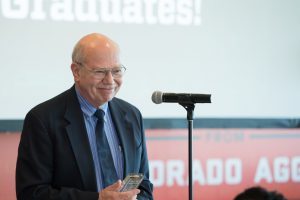
Systems engineering is characterized by its broad scope in thinking, and the broader the lens on a problem the more holistic the solution.
From his Air Force experience through being a professor of practice in the Department of Systems Engineering, Mike Borky’s widely varying career is one that embodies systems-thinking, full of unexpected, yet transformational opportunities.
As Borky retires from CSU on May 15, it is time to look back on his career.
“It’s been a very diverse, unpredictable, mostly interesting, frequently rewarding career,” Borky said.
Joining the Air Force
After graduating from The Catholic University of America with a bachelor’s degree in electrical engineering, he was commissioned to the Air Force from ROTC. The Air Force offered for Borky to enroll in a program that deferred entry into active duty by going into graduate school at his own expense.
He accepted the offer and started his master’s program at MIT, marrying his future wife Roberta in the summer between his two years in the program.
“I was a starving graduate student at MIT,” Borky said. “Roberta and I could only get married because she had a job as a teacher.”
He graduated from MIT in 1969 with two master’s degrees: a master of science in electrical engineering and a professional degree as an electrical engineer.
Family council and a doctoral program
He began active duty in the Air Force during the height of the Vietnam War. After five years, Borky was asked if he would be interested in an Air Force-funded doctorate program, with an active duty requirement of about 20 years. He held what he refers to as his first “family council” with Roberta to decide if this was something they were interested in.
The “council” decided to go forward with the Ph.D. program.
They moved to Ann Arbor so he could attend the University of Michigan, where Borky completed his Ph.D. program. He now had four degrees, and core expertise in solid state electronics. “I was essentially trained as a chip designer,” Borky added.
His expertise led him to become a faculty member teaching electronics at the Air Force Institute of Technology. After four years, Borky was given the choice to work in Seoul, Korea or return to Washington D.C.
His family council reconvened, now including their newborn daughter, Jean.
They chose the assignment in Washington D.C. which turned out to be a transformational position.
“Everything except fly airplanes”
He was made the Air Staff Action Officer for, what was at the time, the highest-priority advanced development program for the Department of Defense. Borky was responsible for getting the budget through congress and writing program direction.
Through the recommendation of his supervisor, Borky received an early promotion to Lieutenant Colonel which led him to become the Director of Avionics for a program that was developing the first mainstream mass-produced stealth fighter.
After retiring from the Air Force in 1992, his family moved to Albuquerque, New Mexico where he worked as a general consultant. Ultimately, he worked in conjunction with Raytheon and Lockheed Martin as a consultant on systems architecture, resulting in a move from Albuquerque to Colorado Springs.
“When I got done and looked back on it I realized that I had the broadest background in the largest number of fields of any other Air Force officer I ever knew,” Borky said. “I did everything in the Air Force except fly airplanes.”
Using his systems knowledge to create new resources
His expertise in systems architecture led him to develop a core course for the then-developing Systems Engineering program at UCLA. When looking for a course textbook, he wasn’t able to find anything adequate, resulting in writing up his course notes.
Those course notes would later form the first draft of the textbook he published in 2018 with Tom Bradley, now systems engineering department head.
An unplanned opportunity came his way with an introduction to Ron Sega, program founder of systems engineering at CSU. Borky’s expertise in systems architecture filled a gap in the systems engineering course offerings, and Sega brought him on board half-time as professor of practice.
Throughout his time at CSU, Borky developed and taught systems engineering architecture, cybersecurity awareness for systems engineers, and advanced model-based systems engineering.
“I think CSU has fundamentally got the right idea to blend world-class researchers with a leavening of us ‘professors of practice’,” Borky said. “It brings a sense of ‘theory is all well and good but let me tell you what actually happens in the field.’”
He also used his expertise to advise several Ph.D. students through the program.
Looking to the future of systems engineering and retirement
Borky expects that other disciplines will begin to see systems engineering as the integrating discipline.
“The reality of today’s world is complexity,” Borky said. “Complexity in several senses: first of all, we build not only systems, but systems of systems, entire enterprises of networked systems that depend upon technologies that are changing rapidly.”
As his retirement starts, he will continue to help the program. He will maintain an unpaid connection to the department and expects other professors will call up for guest lectures.
But he’ll also be part of an expanded family council. Roberta and he will be very busy grandparenting their grandkids Allison and Tylor, and he also hopes to pick back up his piano practice after a lapse of twenty years. Like his career, he’s not expecting boredom.
“I used to joke that one time, they were going to give me an assignment that I knew something about beforehand and I would die of boredom,” Borky said. “But that never once happened.”